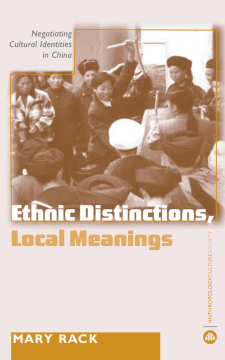
Additional Information
Book Details
Abstract
This innovative book explores the way Western anthropologists use studies of ethnicity to 'interpret' local cultures. Mary Rack raises critical issues about ethnic classifications and the way they are used, making this a book that will be useful for all students of ethnicity.
Overturning the generalising tendencies characteristic of classic anthropology, Rack demonstrates that ethnic classifications have little to do with the self-perceptions of those concerned - and everything to do with political and intellectual elites.
Focusing on a rural area of south China, Rack shows how so-called ethnic minority cultural events have become occasions for the exploration of personal identity by urban elites. She suggests that, historically, ethnic classifications were drawn up as a result of elite concern to demonstrate the existence of a contrasting homogeneous and superior civilisation. This study sheds new light on the ways in which Western anthropologists handle ethnicity and ethnic difference more generally.
'An extremely valuable text. I would unreservedly recommend this ... coherent and clear and written in a style which is fluent and accessible'
Dr Harriet Evans, University of Westminster
Table of Contents
| Section Title | Page | Action | Price |
|---|---|---|---|
| Contents | v | ||
| Acknowledgements | vi | ||
| 1. Where are the Miao? | 1 | ||
| 2. Miao Rebels and ‘Common Ground' | 21 | ||
| 3. Multiple Meanings of the Miao | 45 | ||
| 4. The Rituals of New Year | 67 | ||
| 5. Authority and the Local | 83 | ||
| 6. Conflict at the Temple of the Celestial Kings | 106 | ||
| 7. Conclusions | 128 | ||
| Notes | 134 | ||
| Bibliography | 143 | ||
| Index | 157 |
